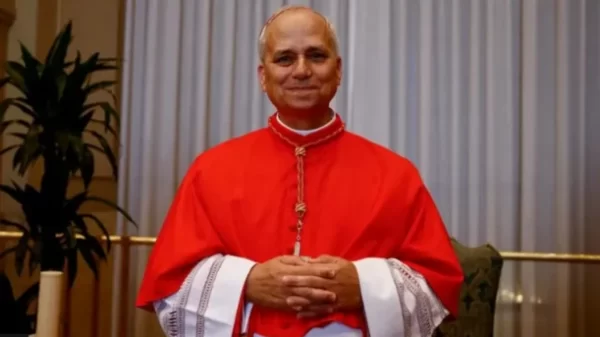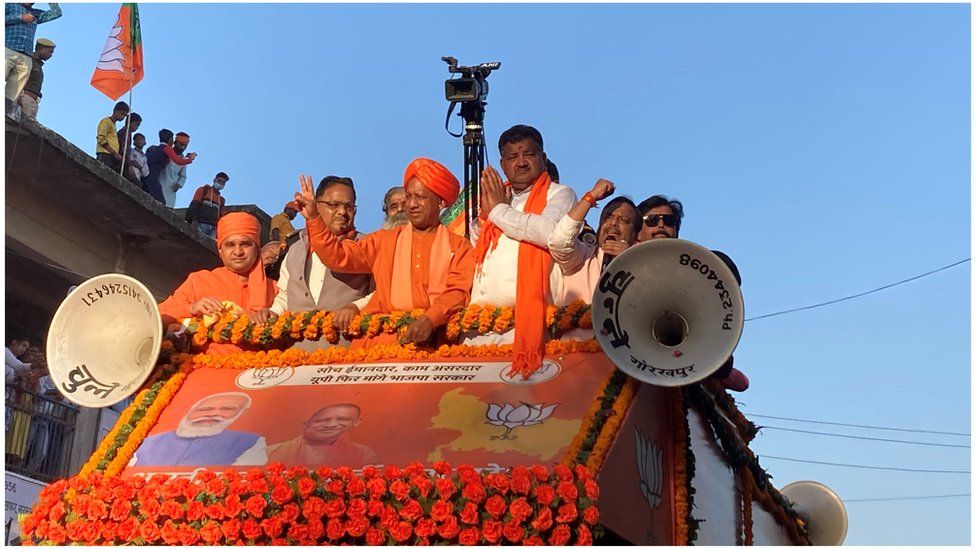India’s governing Bharatiya Janata Party (BJP) looks set for a comfortable win in the most populous state of Uttar Pradesh (UP), breaking a jinx of a quarter of a century for any party to win a second consecutive term there.
Leading the party’s campaign from the front has been incumbent Chief Minister Yogi Adityanath, the shaven-headed, saffron-robed Hindu monk-turned-politician.
His impending victory comes despite there having been no apparent electoral wave in his favour. He’s also been fighting anti-incumbency after five years in office – and saboteurs reportedly acting against him within his own party.
Last week, I watched him campaign in his eastern constituency of Gorakhpur, where he is the head priest of an influential temple.
As his “chariot” – a truck decorated with marigold flowers – snaked through the narrow congested streets, thousands of supporters lined up along the way to cheer him, many stood on balconies and rooftops for a glimpse, showering him with rose petals.
Mr Adityanath flashed the victory sign as loudspeakers blared party anthems and Hindu religious slogans rent the air. One BJP MP, standing alongside Mr Adityanath, called the roadshow “a celebration of victory”.
It seemed a little premature at the time, but Thursday’s results show their confidence was not misplaced.
A highly controversial figure, Yogi Adityanath is loved and loathed in equal measure. To his followers, he’s a holy man, a Hindu icon, a “reincarnation of the gods, a God himself”.
But critics describe him as India’s most divisive and abusive politician who often uses his election rallies to whip up anti-Muslim hysteria.
Under his five-year rule, lynchings and hate speech against Muslims routinely made headlines, the state brought in a controversial law against interfaith marriages and arbitrarily shut down abattoirs and restaurants serving meat, mostly run by Muslims. His second term in power is expected to further shrink the space for the state’s 40 million Muslims.


Despite its political significance, UP remains one of the poorest states in the country. And in the past five years, it has regressed further – its economy has taken a downturn, unemployment has soared, prices of essentials have hit the roof and the state has routinely made headlines for gruesome crimes against women.
Last year, the state was in the news for poor management of the Covid-19 pandemic, with thousands dying without treatment, funeral pyres burning day and night and India’s holiest river the Ganges swollen with bodies.
But despite protests and frustrations expressed by the citizens, the BJP has scripted history with what looks like a landslide in the bellwether state.
Sharat Pradhan, veteran journalist and author of a recent book on Mr Adityanath, says he has been able to convince voters that the state has progressed under his rule, “even if based on half-truths and falsehoods”.
“No one can beat the BJP in propaganda. The party spent 6.5bn rupees [$85m; £65m] on publicising Mr Adityanath’s achievements even though lots of projects remain on paper. They have also shown many of the projects of previous governments – such as the Lucknow Metro, women’s helpline, an expressway and a cricket stadium – as their own.”
The BJP, he says, also successfully built the narrative that they alone could maintain law and order and provide security to women. But above all, he says, Mr Adityanath’s win shows that he succeeded in polarising voters along religious lines.
“Hindutva [hardline Hindu nationalism] is his major selling point. For his diehard supporters, it’s not important what Yogi Adityanath does for them, but what he does against Muslims – the people they look at with suspicion. And it’s that argument that has won.”

Image source, AFP
Umesh Pathak, a journalist in Gorakhpur, says that a number of welfare schemes that the government pursued in the state also seem to have worked with the voters.
Since the start of the pandemic in 2020, the government has distributed free rations to 150 million people and helped the poorest families build thousands of homes and toilets.
“Under him, the local administration has done a lot of work. Yogi is very hard working, he holds regular meetings to assess the progress on schemes and that keeps officials on their toes,” Mr Pathak said.
In 2017, Yogi’s appointment as the chief minister had surprised one and all. Prime Minister Narendra Modi, who’d directly led the party’s campaign, had his own choice for the top job in the politically crucial state which elects the maximum number of MPs – 80. But Yogi was appointed at the insistence of the Rashtriya Swayamsevak Sangh (RSS) – a Hindu nationalist group that Mr Modi was once a member of.
This time, his supporters say, a thumping win for the party could make Yogi invincible.
But would it?
In Gorakhpur and the state capital, Lucknow, last week, the rumour mills were full of talk of a major rift between the monk and the top BJP leadership.
A senior party leader in the state told me that Yogi’s ambition made the party leadership “uneasy”.
“Within six months after he took over, rumours began spreading that he was going to be the next prime minister and that did not go down well with Mr Modi or his second-in-command Amit Shah who perceive him as competition – and a threat,” he said.
Mr Adityanath also seems to have alienated many former friends and colleagues, with one of them saying that there are people working from within the party to ensure his defeat.
“Politics is not an individual’s game, you have to be a team player, but he’s very rigid. Politics is like kite-flying – you have to tighten and loosen the string, if you don’t loosen it at the right time, it would get snatched,” he said.

But Dwarika Tiwari, Mr Adityanath’s deputy at the temple who has worked closely with him for three decades, rubbishes rumours of sabotage.
“It’s a large state, you cannot satisfy everyone, but he always acts with good intentions and has succeeded in what he set out to do. He’s brought in transparency in governance, in the way jobs are given and the state is run. People are not unhappy with his government,” he told me, insisting that the party would reappoint him as the chief minister.
“Why would they not reappoint him? If your child is ahead of everyone in the class, why would you think that he would not pass the exams?” he asks.
Journalist Sharat Pradhan says talk of a rift within the party are real.
“Yogi has been known to be very defiant to Mr Modi but if the party eases him out from the state, they’ll have to give him a ministerial post at the centre to mollify him. They cannot completely cast him out because he could create trouble for the leadership,” he says.
Five years ago, Yogi Adityanath was described as “BJP’s tomorrow”. Age is on his side – at 49, he’s 20 years younger than Mr Modi – and many have wondered if in time, he could lay a claim to the prime minister’s seat.
Today, he appears a bit closer.

See more of our coverage on the Uttar Pradesh elections:
This video can not be played
To play this video you need to enable JavaScript in your browser.





























